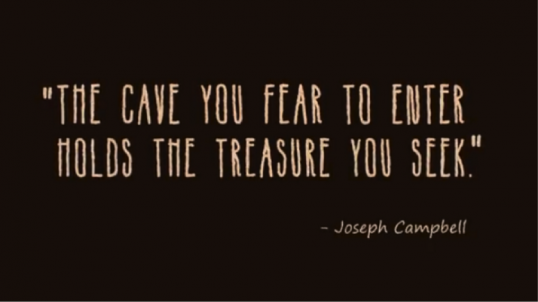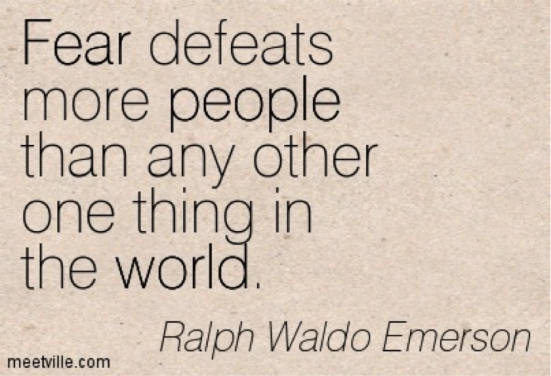FEAR: THE GOOD, THE BAD AND THE UGLY

 You probably never thought about this before; but if you were ever face to face with a grizzly bear, you might think you’d run.
You probably never thought about this before; but if you were ever face to face with a grizzly bear, you might think you’d run.
But when I encountered a huge, teeth-baring, grizzly bear, I didn’t. I stood frozen, unable to move.
It was July, and my husband and I were hiking in northwest Canada, backcountry, in the Rocky Mountains. I’d asked a local man at the base about the possibility of seeing a bear and he laughed at me, dismissing me as an inexperienced, or let’s say spoiled, New Yorker.
Not completely convinced we’d be safe, I hiked into the wilderness anyway.
After about an hour, I looked around at the magnificent, yet solitary, land and began to think about my children at home and how dangerous this adventure could potentially be.
What if I tripped and sprained my ankle?
What if my husband did?
We didn’t have cell phones back then (not that there would’ve been reception) and one of us would be forced to leave the other alone in order to travel down the mountain terrain to get help.
I started to panic as I let in that this escapade was in fact a bad idea. I kept a close watch for bears and other wildlife like mountains lions and bobcats.
My husband made growling noises and as I assured him he wasn’t funny, my anxiety rose.
So when he stopped abruptly and mouthed, listen, like the boy who cried wolf, I didn’t believe there was anything to listen to and I kept on.
But when he threw his arm out in front of me, a shield, to stop me from walking, I knew he wasn’t kidding around any longer.
And then I heard a growl, a heart-stopping, fierce, roar.
I turned and approximately two hundred feet away a grizzly bear towered on its hind legs.
We didn’t budge.
Remarkably, the bear came down on all fours and took off up the mountain with a speed and force that was mind-blowing.
My husband wanted to continue on to Rummel Lake, where we’d been headed. But I refused. (Some people need a brick to fall on their head. I needed a grizzly bear to roar at me. But I finally put my foot down and ended our expedition.)
Later, I thought about the fight or flight survival instinct and didn’t understand why I froze when encountering the bear, which considering how fast the bear could run was an excellent choice.
But freezing, it turns out, has been added to the list of possible reactions. (Fight, Flight, Freeze.)
Fear is a necessary and useful emotion, essential for human survival.
But fear can also hurt us. Sometimes our brains misconstrue every day discomfort, equating it with danger, prompting extreme anxiety.
Too often the freeze instinct causes us to experience a kind of paralysis in our every day (difficult but not life threatening) lives.
I realized this recently when I considered emailing an agent who was reading my full manuscript. She had written to me saying she loved my novel and would get back to me soon. After many weeks, I resisted following up.
And then I realized why.
I was afraid.
It was more comfortable for me to stay in a hopeful place than it was for me to get a final “no”.
I was being controlled by my fear.
 Not too long ago, I would’ve told you that fear was not an emotion I felt often. I would’ve told you that I had a healthy amount of fear (that kicked in appropriately when confronted by wildlife in the wilderness) but that it didn’t control my every day behavior.
Not too long ago, I would’ve told you that fear was not an emotion I felt often. I would’ve told you that I had a healthy amount of fear (that kicked in appropriately when confronted by wildlife in the wilderness) but that it didn’t control my every day behavior.
I’ve begun to see how it has affected me and how with its stifling nature, it has slowed me down a bit. It took me ten years to write my novel, and I can say now that the delay was due largely to fear.
Fear my novel wouldn’t be good enough, fear I wasn’t good enough or talented enough to write a full-fledged book. Fear I’d fail. Fear I’d expose too much and that my family and community would not be happy with me.
Just as I stood powerless in the mountains, facing a bear, unable to move in any direction, I sat staring at my computer screen unable to write a word.
It was my survival instinct (freezing) kicking in, which today translates into resistance.
The creative process may entail some fear; but if we pay attention, fear can be used for good. Often, it shows us what we must do.
I’ve heard, write what you know. But my favorite is, write what you fear.
There will be times we should stay put (stop dead in our tracks).
But there will be other times that we might need to move through the fear and do the very thing that frightens us. It may be vital for us, and the growth of our spirit.
Recommended
Nor’easter
Post-Op Appointment With My Father
Cedar Valley Youth Poet Laureate | Fall 2024 Workshop






